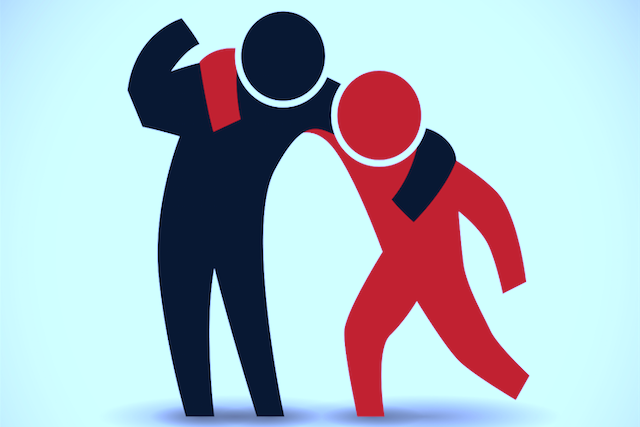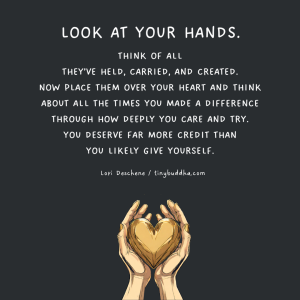
“When you ask for what you need and receive what people and the world have to give, you reduce stress and gain energy.” ~Amanda Owen
It started out innocently enough. The guy I was dating (let’s call him Eric) was applying to jobs, and I, a writer, could help him with cover letters and applications. I offered to help and thought nothing of it. It seemed like a simple thing to do for someone I cared about.
A few weeks later, Eric had some car trouble and I lent him my car. He drove it around for a week and returned it with less than a quarter tank of gas. Not really awesome of him, but not worth getting angry over. After all, he just had to pay for car repairs and I knew that money was tight for him.
Then one night, Eric and I had plans to hang out. I texted him when I was leaving my house to say he could expect me in twenty minutes.
He replied asking if I could bring two rolls of paper towels with me. Kind of a weird request, but okay…I obliged. When I got to Eric’s apartment and asked why he had me bring paper towels, he shrugged and said that he had run out.
At this point in the story it is probably worth mentioning that Eric lived across the street from a convenience store, where they sell (wait for it…) paper towels.
I wish I could say I ended things there, but this pattern continued until Eric had moved into my house, taken over two spare rooms, parked himself permanently in front of the TV playing video games, and relied on me to cook, clean, and buy all food and supplies for the household.
Eric kept saying he’d pay rent, but never seemed to have the funds, and I knew he made less money than I did so I didn’t press the issue.
He rarely paid when we went out for dinner or drinks; I usually picked up the tab for both of us because I just wanted to get out of the house. I was frustrated, but trying to be supportive and “help” someone through a hard time.
Then after a year and a half I finally started to see (and feel) how damaging this relationship dynamic was.
Eric not only mooched off of me for material things, but he was also draining all of my emotional energy. I’m not sure he was even aware of what he was doing. He was just so bad at managing his own life, coping with hardships, and being an adult that my earnest effort to help him positioned me as his crutch.
This situation is not uncommon; I think we all sincerely want to help when our loved ones are struggling. But there has to be a limit. You simply can’t get caught up in giving so much that your own need for support and caring is squeezed out of the relationship entirely.
The lessons I learned from my experience with Eric can be summed up in four ways:
1. Don’t brush off the “little” things.
It’s easy to make excuses for someone, especially if they’re charming and you genuinely care about them. But be aware of how much laxity you’re granting.
Small things you may be tempted to ignore for the sake of being nice or keeping the peace do have a cumulative effect. If you’re constantly talking yourself into feeling better about someone’s behaviors, it’s time to speak up.
2. Set boundaries and hold the other person accountable.
Just because you can help in a situation doesn’t mean you have to. When you let someone take advantage of your kindness or generosity, you’re setting a dangerous precedent. When someone goes too far in asking something of you, tell them how their request makes you feel and explain why you are choosing not to grant it.
3. Ask for stuff.
Don’t forget that it is important for the other person to understand and respond to your needs, too. If asking for what you want is difficult, start small. Ask them to change the radio station if you don’t like the song, or ask them to hold your hand in public if you need more affection.
Practicing with low-stakes requests will help build confidence for when you need to ask someone to meet your larger needs and desires.
4. Check in with yourself often.
Avoid the pitfall of making the other person the star of the relationship while you play supporting cast. Make a habit of taking time for yourself, reflecting on how the relationship makes you feel, and noting areas of imbalance you need to address. If being with someone is draining you financially or emotionally, it’s time to make changes.
Being in the constant role of caregiver is not just a disservice to you, but a detriment to the relationship itself.
When two people are not on equal footing there’s no room for a real connection to flourish. It’s always a wonderful thing to show kindness and support to a loved one—just be sure to keep a portion of yourself that’s just for you.
Help vector illustration via Shutterstock
About Holly Russel
Holly Russel has a BA in Journalism from New York University. She works as a marketing copywriter and counts dogs among her favorite things on the planet – along with tacos, books, social media, and New York City. When she’s not behind a laptop, Holly spends her time practicing yoga, kayaking, and indoor cycling. She lives and writes in Wilmington, NC. Visit her at hollyrussel.com.













 Though I run this site, it is not mine. It's ours. It's not about me. It's about us. Your stories and your wisdom are just as meaningful as mine.
Though I run this site, it is not mine. It's ours. It's not about me. It's about us. Your stories and your wisdom are just as meaningful as mine. 